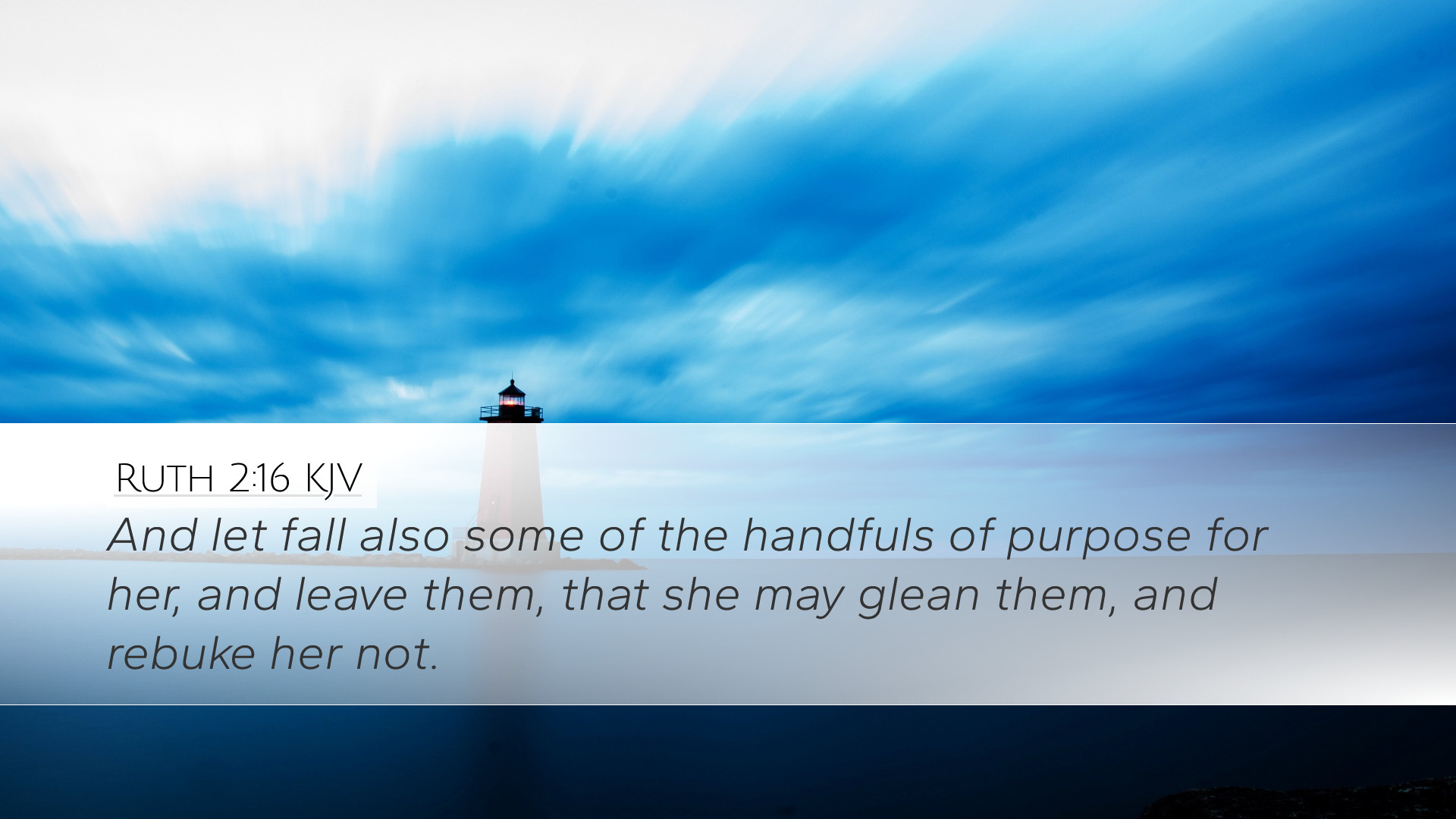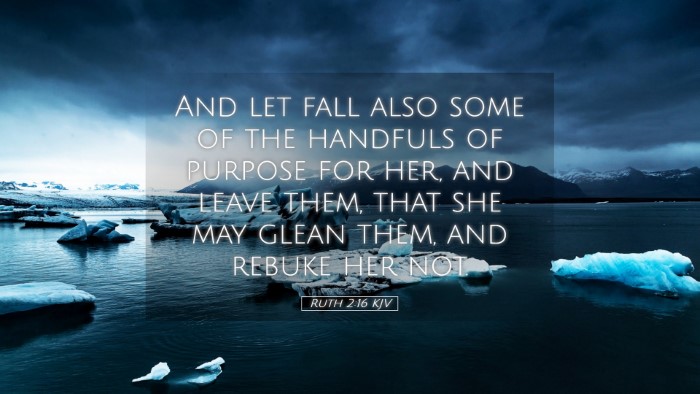Old Testament
Genesis Exodus Leviticus Numbers Deuteronomy Joshua Judges Ruth 1 Samuel 2 Samuel 1 Kings 2 Kings 1 Chronicles 2 Chronicles Ezra Nehemiah Esther Job Psalms Proverbs Ecclesiastes Song of Solomon Isaiah Jeremiah Lamentations Ezekiel Daniel Hosea Joel Amos Obadiah Jonah Micah Nahum Habakkuk Zephaniah Haggai Zechariah MalachiRuth 2:16
Ruth 2:16 KJV
And let fall also some of the handfuls of purpose for her, and leave them, that she may glean them, and rebuke her not.
Ruth 2:16 Bible Commentary
Commentary on Ruth 2:16
Bible Verse: Ruth 2:16 - "And let fall also some of the handfuls of purpose for her, and leave them, that she may glean them, and rebuke her not."
Introduction
The verse under consideration captures a significant moment in the book of Ruth, highlighting the character of Boaz and the providential care God provides to those in need. This commentary synthesizes insights from prominent public domain commentaries to shed light on the theological implications and practical applications of Ruth 2:16.
Contextual Background
The narrative of Ruth is set during the time of the judges in Israel, a period marked by social unrest and moral ambiguity. Ruth, a Moabite widow, demonstrates loyalty and faithfulness to her mother-in-law Naomi, which sets the stage for her encounter with Boaz, a kinsman-redeemer.
In the immediate context of this verse, Ruth has come to glean in the fields of Boaz, who is introduced as a relative of Naomi’s deceased husband. Boaz’s willingness to provide for Ruth not only illustrates his generosity but also emphasizes the law's provision for the poor and the vulnerable within Israelite society.
Analysis of the Verse
“Let fall also some of the handfuls of purpose for her”
This phrase suggests intentionality on Boaz's part. Matthew Henry notes that Boaz's directive to his harvesters reflects an understanding of the law which instructs landowners to allow the poor to glean from the edges of their fields (Leviticus 19:9-10). Here, however, Boaz goes above and beyond mere legal obligation by actively ensuring that Ruth receives ample provision.
“And leave them, that she may glean them”
This portion of the verse conveys the deliberate care Boaz wishes to extend to Ruth. Albert Barnes emphasizes the notion of 'leaving' - it embodies a benevolent act towards the vulnerable, instilling a sense of community responsibility. This act of leaving handfuls of barley not only provides Ruth with physical sustenance but also signifies inclusion and acknowledgment within Israel's community of faith.
“And rebuke her not”
The concluding phrase is pivotal as it demonstrates the protection and encouragement Boaz extends to Ruth. Adam Clarke interprets this as a significant act of compassion, contrasting with the possible scorn or dismissal that Ruth could have faced as a foreigner. By barring any rebuke, Boaz ensures Ruth feels safe and dignified in her act of gleaning.
Theological Implications
Several theological themes emerge from this verse, relevant to both the context of ancient Israel and contemporary applications for the church today:
- God’s Providence: The actions of Boaz reflect God’s providential care for those in need. Ruth’s experience is a testimony to how God orchestrates circumstances for the well-being of individuals.
- Community and Care: The communal aspect of gleaning underscores the responsibility of the community to care for the vulnerable. As Boaz fulfills this role, he exemplifies the nature of a faithful follower of God.
- Dignity and Inclusion: Boaz’s recognition of Ruth’s dignity serves as a reminder of the importance of treating all individuals with respect, regardless of their background or status.
Practical Applications
For pastors and scholars, the insights derived from Ruth 2:16 can lead to significant implications in the realm of pastoral care and community engagement:
- Embrace Intentional Generosity: Communities of faith are called to be proactive in their generosity, creating opportunities for individuals to thrive rather than merely survive.
- Foster Safe Spaces: Churches should strive to be environments where individuals, especially the marginalized, feel welcomed without fear of judgment or rebuke.
- Promote Justice and Inclusion: Reflecting on Boaz’s example, congregations must be vigilant in advocating for justice and equality, ensuring that all individuals receive fair treatment and kindness.
Conclusion
Ruth 2:16 is a profound verse rich with implications for both the ancient context and contemporary church life. By examining Boaz's actions and heart towards Ruth, we glean valuable lessons about generosity, community responsibility, and the vital importance of maintaining dignity for all individuals. These principles are essential for pastors, theologians, and scholars as they seek to live out and teach the principles of God's Kingdom in a complex world.


